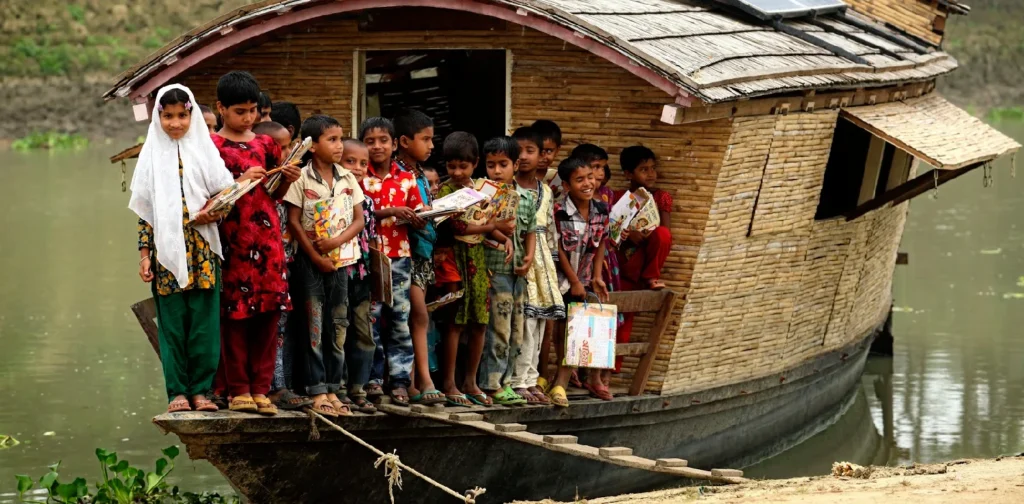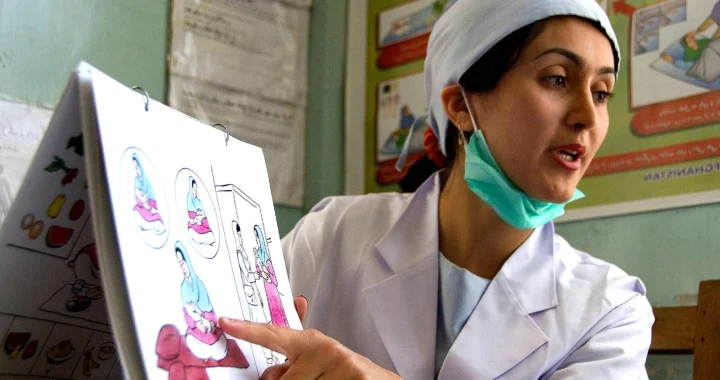Floating Schools, a Community-based Initiative amid Bangladesh’s Climate Hazards

Photo: Shidhulai Swanirvar Sangstha
Annual floods and the climate crisis have disrupted access to education for millions of children in Bangladesh. Amid these challenges and a lack of systemic interventions, grassroots, local initiatives have emerged. One of them is Floating Schools, which provides solar-powered boat schools to bridge access to learning for children when floods strike.
How the Climate Crisis Affects Education
Extreme weather events are disrupting lives across the globe. Education, a foundational aspect that enables us to lead a good life, is no exception. In 2024 alone, climate-related shocks such as floods, heatwaves, and storms have affected over 242 million students in 85 countries, according to a UNICEF report.
South Asia is one of the most affected regions. In Bangladesh, around 35 million children suffer the impacts of disasters, with over 600,000 students losing access to school annually due to flooding. Damaged infrastructure, unsafe learning environments, and inaccessible roads leave schools no choice but to suspend activities—often for weeks. This suspension raises the risk of school dropouts, especially among vulnerable groups. In short, these frequent disruptions can influence students’ educational outcomes as well as personal and professional growth, even perpetuating the cycle of poverty if left unaddressed.
The Floating Schools Initiative
In response to the educational challenges posed by climate disasters, a local non-profit organization, Shidhulai Swanirvar Sangstha, introduced Floating Schools. Floating Schools is an initiative providing solar-powered classrooms on boats. Launched in 2002, this program was designed to address the needs of children in remote areas of Bangladesh who are regularly cut off from school during seasonal floods.
Each Floating School is equipped with solar panels that power the boat’s operations. It contains a classroom space complete with books, blackboards, internet-connected computers or laptops, and other digital learning tools. The boats follow a daily route, picking up students from riverside stops and then docking to begin lessons.
Beyond formal education, students also learn digital skills and explore their creativity, such as through digital drawing. The Floating Schools also teach an environmental river-based curriculum. Additionally, solar energy enables evening classes, supporting children who work during the day.
The program includes floating libraries, mobile training units, playgrounds, and clinics as well. On estimate, the Floating Schools initiative can reach around 150,000 villagers every year.
Possible Replication and Other Efforts
The Floating Schools initiative in Bangladesh has not only brought local benefits but also opened up opportunities for replication in other countries facing similar challenges. The concept has been adapted in countries such as Vietnam, Nigeria, and Zambia, with adjustments based on local needs, urgency, and available resources. By utilizing locally sourced materials and renewable energy, the model is relevant and scalable in regions lacking climate-resilient educational infrastructure.
While community-based, localized efforts can have a wide impact, we must keep striving for systemic interventions to address the interlinking issues between disaster and education. Establishing safe school buildings, investing in adaptive learning processes, ensuring the welfare of the education workforce, and integrating climate and disaster learning into the education system are several ways to build a resilient education system against crises.
Editor: Nazalea Kusuma & Kresentia Madina


 Looking into the Global Midwife Shortage
Looking into the Global Midwife Shortage  Reframing Governance in the Era of Water Bankruptcy
Reframing Governance in the Era of Water Bankruptcy  Strengthening Resilience amid Growing Dependence on Space Infrastructure
Strengthening Resilience amid Growing Dependence on Space Infrastructure  Indian Gig Workers Push Back Against 10-Minute Delivery Service Strain
Indian Gig Workers Push Back Against 10-Minute Delivery Service Strain  Call for Governance: Grassroots Initiatives Look to Scale Efforts to Conserve Depleting Groundwater
Call for Governance: Grassroots Initiatives Look to Scale Efforts to Conserve Depleting Groundwater  Integrating Environment, Climate Change, and Sustainability Issues into Education Systems
Integrating Environment, Climate Change, and Sustainability Issues into Education Systems